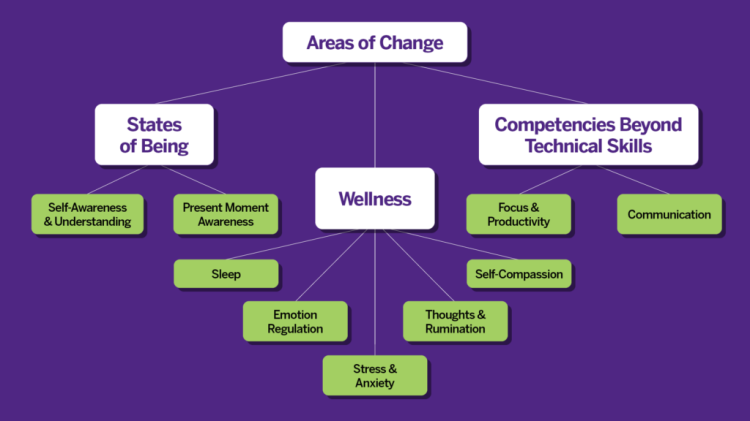The Western law professor was hospitalized for the depression and mood disorder he had been battling since his time as a young first-year legal associate. He looked down in surprise at the patient calendar of activities, featuring mindfulness alongside educational workshops, recreational activities and group therapy.
The class involved sitting in a circle and breathing, based on evidence it would lead to improved mental health.

Thomas Telfer (Anna Toth)
Telfer initially rejected the idea. "I thought it was a waste of time," he said.
However, over time he discovered daily mindfulness had a profound impact on his mental health. It brought him clarity, focus and a sense of calm.
He also gained a deeper understanding of the practice, universally described as paying attention to what's happening in the present moment in the mind, body and external environment, with an attitude of curiosity and kindness.
Telfer recalls returning to work, making two key decisions.
"First, I was going to make mindfulness a feature of my life. Second, I was determined to bring mindfulness to Western. Law students experience a great deal of stress and anxiety, and I thought if I could reach even a small group of students, it might just improve their quality of life."
Research shows his instincts proved correct.
Telfer participated in a collaborative qualitative study based on student reflections of his upper-year credit course, Mindfulness and the Legal Profession. His co-authors included Western cognitive scientist Emily Nielsen, Sara Ahola Kohut, a psychologist at the Hospital for Sick Children and Elli Weisbaum, a professor in the Buddhism, Psychology and Mental Health program at the University of Toronto. Their findings, recently published in the UBC Law Review, show the course had a significant impact on participants' mental health. Designed to include discussion on other topics such as focus and distraction, emotional intelligence and resilience, the course also led to growth in skills relevant to the legal profession.
"It took my own mental health crisis to open my eyes to the daily mental health struggles of my own students. This led me to mindfulness and mindfulness education, motivating me to introduce the course given the rise of poor mental health in the legal profession."- Professor Thomas Telfer, Faculty of Law
Mindfulness in legal education enhances wellness, competencies, states of being
Telfer launched the Mindfulness and the Legal Profession course in 2019, building on the success of the Mindfulness Ambassador Program he ran two years prior as a pilot project and optional non-credit course for first-year students. The optional course was developed by Mindfulness Without Borders (now The Global MINDS Collective), a provider of evidence-based mindfulness programs for youth, educators, health and corporate professionals worldwide.
In 2018, Telfer was awarded a Western Teaching Fellowship through which he developed his own upper-year course. Western was the first law school in Canada to offer a mindfulness course for credit. Course modules in Mindfulness and the Legal Profession included an introduction to guided meditation and essential readings on mental health and the legal profession, mindfulness, active listening, emotional intelligence, resilience and compassion and the impact of mindfulness on negotiations and legal ethics.
Students were required to maintain a daily mindfulness practice for at least 10 minutes, keeping a confidential personal log to track their progress and checking in with a classmate at least once a week to share how their meditation practice was going.
They also submitted weekly journals reflecting on their experiences with the mindfulness exercises and course materials. Final journal submissions asked about the impact of the course on the students' school and personal lives, and how it might affect them professionally.
Analysis of the final journal submissions from the 2022 cohort showed students experienced positive outcomes in three key areas: wellness, competencies beyond technical skills and states of being.

Thematic map depicting areas of change experienced by students. (Emily Nielsen)
Students reported improved mental health - better sleep, reduced stress and anxiety and greater self-compassion. Some noted improvements in managing PTSD, depression and anxiety. They also reported that increased awareness led to healthier coping mechanisms.
"I find now that when I am anxious or in a depressive rut, the first thing I reach for is a guided meditation," one student wrote. "These meditations allow me to center myself during high stress periods and have even improved my chronic insomnia."
Beyond wellness, students gained skills, including enhanced communication techniques, improved active listening and increased focus and productivity.
They also reported feeling more grounded, possessing a better understanding of their personal and professional goals and building a sense of community within the class.
"This course has allowed me to think critically about the type of lawyer I want to be," one student wrote. "I had equated being a zealous advocate with being a combative one. I'm no longer convinced that's true, nor am I convinced it's a good career move. I think integrating mindfulness into my career will mean focusing on an empathetic and collaborative approach to law."
"My final goal at the course's inception was to be a happier person. Armed with the lessons the mindfulness course provided, I now see what a misguided goal that was. The absence of pain and suffering is an unattainable state. It is through experiencing these feelings of anxiety and sadness, and recognizing they are not permanent, that one learns to manage the mind and lead a happy life." - Student reflection, Mindfulness and the Legal Profession course
Ongoing feedback from students is gratifying for Telfer.
"I become very emotional reading their responses," he said. "I've taught this course six times now and occasionally I have students write to me from their practices, saying they're still using these skills."
Bringing mindfulness to the legal profession
Knowing past students are carrying what they've learned forward into their careers holds great significance to Telfer.
As co-editor and contributor to The Right Not to Remain Silent: The Truth About Mental Health in the Legal Profession, Telfer knows inaccurate, stigmatizing messages around mental health are causing too many members of the legal community to suffer in isolation.
A key part of his mental health journey has been overcoming the self-stigmatization that led him to hide his mood disorder for many years. But after accepting an invitation to appear in a Zero Suicide Initiative video for St. Joseph's Health Care in London, Ont., he felt empowered to share his story.
He continues to tell it today, teaching mindfulness to students and peers in the legal profession.
"I once believed mental illness was a weakness I could just get over by trying harder," he said. "What I now know about the reality of mental illness is a long way from what I believed as a young lawyer."
He's heartened to see current law students' openness to being vulnerable and discussing mental health and grateful for the support they can access through wellness services at Western and the Faculty of Law.
But there's still work to do industry wide.
According to a recent research report by the Université de Sherbrooke, the Federation of Law Societies of Canada and the Canadian Bar Association, a study of 7,800 legal professionals across Canada showed between 50 to 60 per cent experience "psychological distress," including burnout, depression and anxiety.
The UBC Law Review study acknowledges the mental health crisis facing the legal profession requires a multi-pronged approach and that developing mindfully trained lawyers is "just one prong."
But it's a start.
The University of Ottawa Faculty of Law began offering a Mindfulness and the Law course in 2022.
With published evidence-based research backing the impact of his course, it's Telfer's "hope and dream" more law schools in Canada will follow suit.
"I think our paper really makes the case," he said. "To answer our research question of, Does mindfulness impact the wellbeing of students?' It absolutely does."











